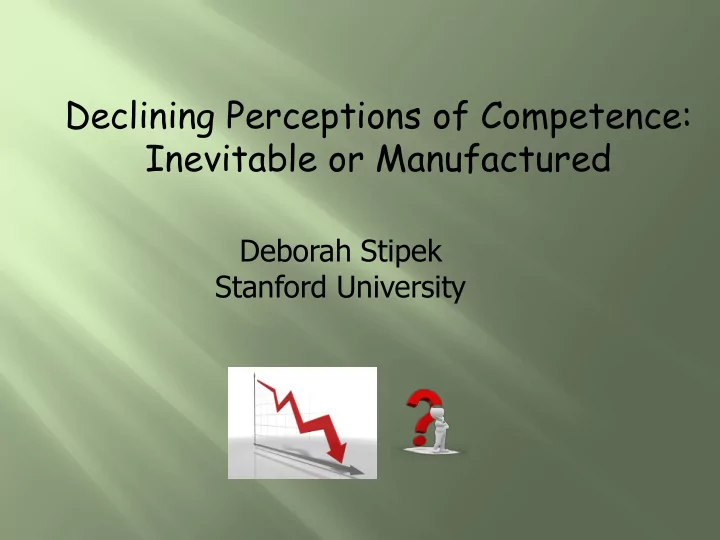

Declining Perceptions of Competence: Inevitable or Manufactured Deborah Stipek Stanford University
5 self 4.5 classmates 4 3.5 3 2.5 2 1.5 1 4-year 5-6 year 6-7 year olds olds olds
Low High Flexible grouping Stable ability grouping No grades on written Grades on written assignments assignments Skill mastery on report Letter grades on report cards cards All work displayed “Best” work displayed Small group instruction Whole class instruction Differentiated tasks Same tasks
20 18 16 14 High Salience 12 Low Salience 10 8 6 Present Future
Child-Centered Teacher-Directed social development academics stressed emphasized process stressed performance stressed diverse activities narrow range of children chose activities children discovered teacher chose through direct experience teacher instructed
32 preschool and kindergarten classrooms (4-6 year olds) 227 children Measured classrooms student motivation in laboratory setting
Teacher-Directed vs. Child-Centered Classrooms (Laboratory) teacher-directed 7 child-centered 5 6 4.5 5 4 4 3.5 3 3 Ratings of Ability Preference for Challenge 6 1.7 5 1.3 4 0.9 0.5 3 Maze Predictions Puzzle Prediction
30 30 teacher direct. child centered 25 25 20 20 Numbers/Math Letters/Reading 16 10 9 14 8 12 7 6 10 Vocabulary Numerical Memory
42 preschool and kindergarten classrooms (4-6 year olds) 228 children Measured classrooms student motivation in classroom setting
Classroom Behavior teacher-directed child-centered 3 1.5 2.5 1.25 2 1.5 1 1 0.75 0.5 0.5 0 Pre Kinder Stress Requests for Help/Approval
Classroom Behavior teacher-directed 3 3 child-centered 2 2 1 1 0 0 Discipline Noncompliance 0.4 2 1.8 0.2 1.6 0 1.4 Negative Affect Prosocial Behavior
4 th - 5 th - & 6 th grades (ages 9-12) 24 teachers, randomly assigned to full intervention or “intervention light” those two groups compared to teachers using traditional methods Measured Teaching practices 1. Student motivation 2. Student learning 3.
Focus on understanding/learning/mastery rather than performance Emphasis on effort Encouragement of student autonomy Positive affect (sensitivity, respect) Psychologically safe environment
Intervent Intervent Traditional Light Perceived Ability** .09 -.16 .06 Mastery Orientation .04 -.01 -.06 Performance Orientation** -.26 .21 .13 Help-Seeking* .01 .17 -.23 Positive Emotions .12 -.08 -.08
Substantive feedback higher perceptions of ability (r = . 42) higher mastery orientation (.67) higher positive emotions (.52) Number of errors/correct answers lower positive emotions (-.42) Check marks for completion lower mastery orientation (-.49) lower positive emotions (-.51)
Decline in perceive competence is not inevitable Depends substantially on quality and nature of teaching and especially evaluative feedback Changing the way teachers teach requires intense, long-term support
Recommend
More recommend